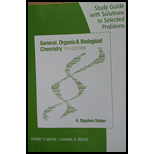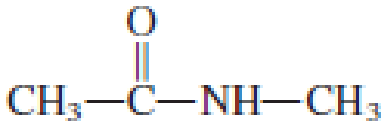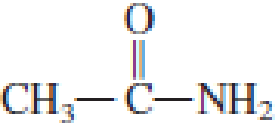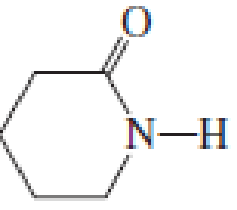
Study Guide with Selected Solutions for Stoker's General, Organic, and Biological Chemistry, 7th
7th Edition
ISBN: 9781305081086
Author: STOKER, H. Stephen
Publisher: Brooks Cole
expand_more
expand_more
format_list_bulleted
Concept explainers
Textbook Question
Chapter 17, Problem 17.103EP
Classify each of the amides in Problem 17-101 as a primary, secondary, or tertiary amide.




Expert Solution & Answer
Trending nowThis is a popular solution!

Students have asked these similar questions
Primary amides have how many C-N bonds?
Which of the following compounds contain an amide functional group?
II
IV
V
O II
O IV
V
O O O O O
17-102 Classify each of the following amides as unsubstituted,
monosubstituted, or disubstituted.
a.
CH3-C-NH2
CH, O
b.
CH3-CH2-CH-C–NH–CH,
с.
CH3-C-N–CH2-CH2-CH3
CH3-CH–CH3
d.
N-CH3
Chapter 17 Solutions
Study Guide with Selected Solutions for Stoker's General, Organic, and Biological Chemistry, 7th
Ch. 17.1 - Prob. 1QQCh. 17.1 - Prob. 2QQCh. 17.2 - Prob. 1QQCh. 17.2 - Prob. 2QQCh. 17.2 - Prob. 3QQCh. 17.2 - Prob. 4QQCh. 17.3 - Prob. 1QQCh. 17.3 - Prob. 2QQCh. 17.3 - Prob. 3QQCh. 17.3 - Prob. 4QQ
Ch. 17.4 - Prob. 1QQCh. 17.4 - Prob. 2QQCh. 17.5 - Prob. 1QQCh. 17.5 - Prob. 2QQCh. 17.5 - Prob. 3QQCh. 17.6 - Prob. 1QQCh. 17.6 - Prob. 2QQCh. 17.6 - Prob. 3QQCh. 17.7 - Prob. 1QQCh. 17.7 - Prob. 2QQCh. 17.7 - Prob. 3QQCh. 17.8 - Prob. 1QQCh. 17.8 - Prob. 2QQCh. 17.8 - Prob. 3QQCh. 17.8 - Prob. 4QQCh. 17.9 - Prob. 1QQCh. 17.9 - Prob. 2QQCh. 17.10 - Prob. 1QQCh. 17.10 - Prob. 2QQCh. 17.10 - Prob. 3QQCh. 17.10 - Prob. 4QQCh. 17.11 - Prob. 1QQCh. 17.11 - Prob. 2QQCh. 17.11 - Prob. 3QQCh. 17.12 - Prob. 1QQCh. 17.12 - Prob. 2QQCh. 17.12 - Prob. 3QQCh. 17.12 - Prob. 4QQCh. 17.13 - Prob. 1QQCh. 17.13 - Prob. 2QQCh. 17.13 - Prob. 3QQCh. 17.13 - Prob. 4QQCh. 17.14 - Prob. 1QQCh. 17.14 - Prob. 2QQCh. 17.14 - Prob. 3QQCh. 17.15 - Prob. 1QQCh. 17.15 - Prob. 2QQCh. 17.16 - Prob. 1QQCh. 17.16 - Prob. 2QQCh. 17.16 - Prob. 3QQCh. 17.17 - Prob. 1QQCh. 17.17 - Prob. 2QQCh. 17.17 - Prob. 3QQCh. 17.18 - Prob. 1QQCh. 17.18 - Prob. 2QQCh. 17.18 - Prob. 3QQCh. 17.19 - Prob. 1QQCh. 17.19 - Prob. 2QQCh. 17.19 - Prob. 3QQCh. 17.19 - Prob. 4QQCh. 17 - Prob. 17.1EPCh. 17 - Prob. 17.2EPCh. 17 - Prob. 17.3EPCh. 17 - Prob. 17.4EPCh. 17 - Prob. 17.5EPCh. 17 - Prob. 17.6EPCh. 17 - Indicate whether or not each of the following...Ch. 17 - Indicate whether or not each of the following...Ch. 17 - Prob. 17.9EPCh. 17 - Prob. 17.10EPCh. 17 - Prob. 17.11EPCh. 17 - Prob. 17.12EPCh. 17 - Prob. 17.13EPCh. 17 - Prob. 17.14EPCh. 17 - Prob. 17.15EPCh. 17 - Assign a common name to each of the following...Ch. 17 - Prob. 17.17EPCh. 17 - Prob. 17.18EPCh. 17 - Prob. 17.19EPCh. 17 - Prob. 17.20EPCh. 17 - Prob. 17.21EPCh. 17 - Prob. 17.22EPCh. 17 - Prob. 17.23EPCh. 17 - Prob. 17.24EPCh. 17 - Prob. 17.25EPCh. 17 - Prob. 17.26EPCh. 17 - Prob. 17.27EPCh. 17 - Prob. 17.28EPCh. 17 - Prob. 17.29EPCh. 17 - Prob. 17.30EPCh. 17 - Prob. 17.31EPCh. 17 - Prob. 17.32EPCh. 17 - Prob. 17.33EPCh. 17 - Prob. 17.34EPCh. 17 - Determine the maximum number of hydrogen bonds...Ch. 17 - Prob. 17.36EPCh. 17 - Prob. 17.37EPCh. 17 - Prob. 17.38EPCh. 17 - Prob. 17.39EPCh. 17 - Prob. 17.40EPCh. 17 - Prob. 17.41EPCh. 17 - Prob. 17.42EPCh. 17 - Prob. 17.43EPCh. 17 - Prob. 17.44EPCh. 17 - Prob. 17.45EPCh. 17 - Prob. 17.46EPCh. 17 - Prob. 17.47EPCh. 17 - Prob. 17.48EPCh. 17 - Prob. 17.49EPCh. 17 - Prob. 17.50EPCh. 17 - Prob. 17.51EPCh. 17 - Prob. 17.52EPCh. 17 - Prob. 17.53EPCh. 17 - Prob. 17.54EPCh. 17 - Prob. 17.55EPCh. 17 - Prob. 17.56EPCh. 17 - Prob. 17.57EPCh. 17 - Prob. 17.58EPCh. 17 - Prob. 17.59EPCh. 17 - Prob. 17.60EPCh. 17 - Prob. 17.61EPCh. 17 - Prob. 17.62EPCh. 17 - Prob. 17.63EPCh. 17 - Prob. 17.64EPCh. 17 - Prob. 17.65EPCh. 17 - Prob. 17.66EPCh. 17 - Prob. 17.67EPCh. 17 - Prob. 17.68EPCh. 17 - Prob. 17.69EPCh. 17 - Prob. 17.70EPCh. 17 - Prob. 17.71EPCh. 17 - Prob. 17.72EPCh. 17 - Prob. 17.73EPCh. 17 - Prob. 17.74EPCh. 17 - Prob. 17.75EPCh. 17 - Prob. 17.76EPCh. 17 - Prob. 17.77EPCh. 17 - Prob. 17.78EPCh. 17 - Prob. 17.79EPCh. 17 - Prob. 17.80EPCh. 17 - Prob. 17.81EPCh. 17 - Prob. 17.82EPCh. 17 - Prob. 17.83EPCh. 17 - Prob. 17.84EPCh. 17 - Prob. 17.85EPCh. 17 - Prob. 17.86EPCh. 17 - Prob. 17.87EPCh. 17 - Prob. 17.88EPCh. 17 - Prob. 17.89EPCh. 17 - Prob. 17.90EPCh. 17 - Prob. 17.91EPCh. 17 - Prob. 17.92EPCh. 17 - Prob. 17.93EPCh. 17 - Prob. 17.94EPCh. 17 - Prob. 17.95EPCh. 17 - Prob. 17.96EPCh. 17 - Prob. 17.97EPCh. 17 - Prob. 17.98EPCh. 17 - Indicate whether or not each of the following...Ch. 17 - Indicate whether or not each of the following...Ch. 17 - Classify each of the following amides as...Ch. 17 - Classify each of the following amides as...Ch. 17 - Classify each of the amides in Problem 17-101 as a...Ch. 17 - Prob. 17.104EPCh. 17 - Prob. 17.105EPCh. 17 - Prob. 17.106EPCh. 17 - Prob. 17.107EPCh. 17 - Prob. 17.108EPCh. 17 - Prob. 17.109EPCh. 17 - Prob. 17.110EPCh. 17 - Assign an IUPAC name to each of the following...Ch. 17 - Assign an IUPAC name to each of the following...Ch. 17 - Prob. 17.113EPCh. 17 - Prob. 17.114EPCh. 17 - Prob. 17.115EPCh. 17 - Prob. 17.116EPCh. 17 - Prob. 17.117EPCh. 17 - Prob. 17.118EPCh. 17 - Prob. 17.119EPCh. 17 - What is the relationship between the acronym DEET...Ch. 17 - Prob. 17.121EPCh. 17 - Prob. 17.122EPCh. 17 - Prob. 17.123EPCh. 17 - Prob. 17.124EPCh. 17 - Prob. 17.125EPCh. 17 - Prob. 17.126EPCh. 17 - Prob. 17.127EPCh. 17 - Prob. 17.128EPCh. 17 - Prob. 17.129EPCh. 17 - Prob. 17.130EPCh. 17 - Prob. 17.131EPCh. 17 - Prob. 17.132EPCh. 17 - Prob. 17.133EPCh. 17 - Prob. 17.134EPCh. 17 - Prob. 17.135EPCh. 17 - Prob. 17.136EPCh. 17 - Prob. 17.137EPCh. 17 - Prob. 17.138EPCh. 17 - Prob. 17.139EPCh. 17 - Prob. 17.140EPCh. 17 - Prob. 17.141EPCh. 17 - Prob. 17.142EPCh. 17 - Prob. 17.143EPCh. 17 - Prob. 17.144EPCh. 17 - Prob. 17.145EPCh. 17 - Prob. 17.146EPCh. 17 - Prob. 17.147EPCh. 17 - Prob. 17.148EPCh. 17 - Prob. 17.149EPCh. 17 - Prob. 17.150EPCh. 17 - Prob. 17.151EPCh. 17 - Prob. 17.152EPCh. 17 - Prob. 17.153EPCh. 17 - Prob. 17.154EP
Knowledge Booster
Learn more about
Need a deep-dive on the concept behind this application? Look no further. Learn more about this topic, chemistry and related others by exploring similar questions and additional content below.Similar questions
Recommended textbooks for you
 General, Organic, and Biological ChemistryChemistryISBN:9781285853918Author:H. Stephen StokerPublisher:Cengage Learning
General, Organic, and Biological ChemistryChemistryISBN:9781285853918Author:H. Stephen StokerPublisher:Cengage Learning Organic And Biological ChemistryChemistryISBN:9781305081079Author:STOKER, H. Stephen (howard Stephen)Publisher:Cengage Learning,
Organic And Biological ChemistryChemistryISBN:9781305081079Author:STOKER, H. Stephen (howard Stephen)Publisher:Cengage Learning, Chemistry for Today: General, Organic, and Bioche...ChemistryISBN:9781305960060Author:Spencer L. Seager, Michael R. Slabaugh, Maren S. HansenPublisher:Cengage Learning
Chemistry for Today: General, Organic, and Bioche...ChemistryISBN:9781305960060Author:Spencer L. Seager, Michael R. Slabaugh, Maren S. HansenPublisher:Cengage Learning

General, Organic, and Biological Chemistry
Chemistry
ISBN:9781285853918
Author:H. Stephen Stoker
Publisher:Cengage Learning

Organic And Biological Chemistry
Chemistry
ISBN:9781305081079
Author:STOKER, H. Stephen (howard Stephen)
Publisher:Cengage Learning,

Chemistry for Today: General, Organic, and Bioche...
Chemistry
ISBN:9781305960060
Author:Spencer L. Seager, Michael R. Slabaugh, Maren S. Hansen
Publisher:Cengage Learning
Nomenclature: Crash Course Chemistry #44; Author: CrashCourse;https://www.youtube.com/watch?v=U7wavimfNFE;License: Standard YouTube License, CC-BY